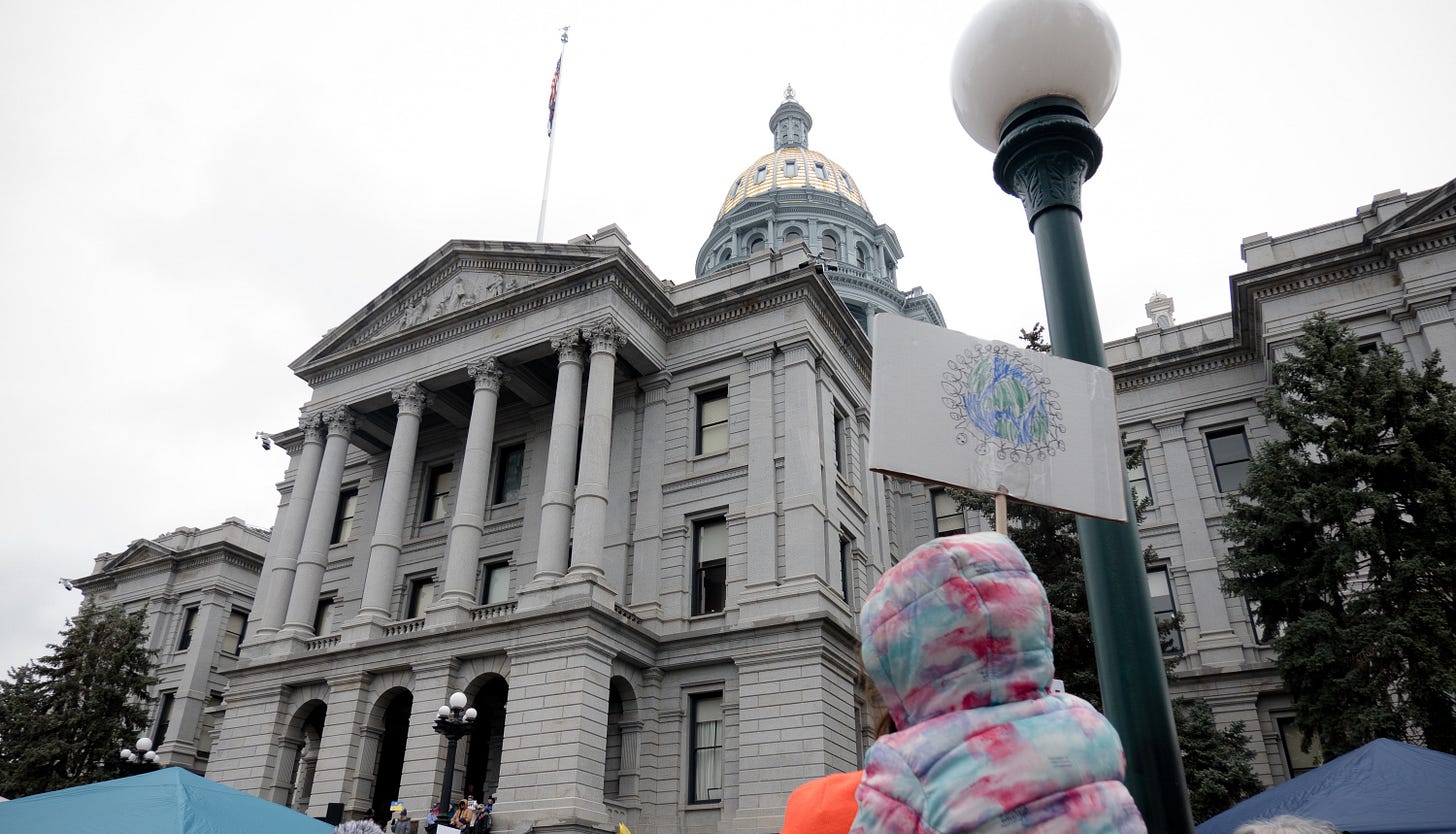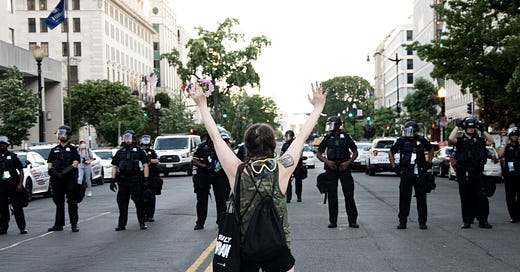
I grew up on the Great Lakes and recognize a seaworthy vessel when I see one. Regarding awakened souls, there have never been more able vessels in the waters than there are right now across the world. And they are fully provisioned and able to signal one another as never before in the history of humankind.
— Clarissa Pinkola Estés
The time for hope is over.
Look: Hope sounds nice, but it isn’t sustaining. It’s like throwing sheets of paper on the fire.
We need actual fuel, long-burning wood, by which I mean we need courage.
You and I and our families aren’t going to overcome fascism on hope alone, especially the sort of hope that is really just wishful thinking, that is really just hope that someone else will fix this, or hope that it will all be okay in the end.
The people who overcome fascism aren’t the people who hope for some external salvation.
They’re the people who ask: what can I do to start resisting NOW, what can I do to protect my people NOW?…and then take action NOW.
(And so is the time for despair.)
This message is not for the people who know how to put in the work and need to rest—everyone needs and deserves chances to step away, rest up, and regroup.
But if you’re a person who has only done things that feel safe, things that take no real risk or sacrifice on your part (and please don’t feel bad if you are, everyone starts as that person) then I’m sorry to say that what you’ve been doing is no longer enough.
Climate-conscious parents everywhere have immense reserves of untapped power and what I want you to know is that you must now use that power.
The time for simply sharing to your socials is over.
The time for simply reading (endlessly reading) newsletters and articles and books—that’s over.
What the world needs now—what your kids need from you now—is courage.
Power wants your body softening in your chair and your emotions dissipating on the screen. Get outside. Put your body in unfamiliar places with unfamiliar people. Make new friends and march with them.
— Timothy Snyder
The days when we could just pat ourselves on the back for “staying informed!” and “spreading the word!” and call it enough are long gone. That was the first step, and an important one, but we cannot afford to park the bus there and let it rust.
Not when the regime is trying to prop up a cardboard king and the global economy is threatening to destroy so many lives and our entire government apparatus is falling to pieces as we rapidly backslide into authoritarianism.
People are struggling—you may be among them—and it’s only going to get worse if we don’t collectively stand up to it.
We can no longer let the people in power decide what is politically possible. We can no longer let the people in power decide what hope is. Hope is not passive, hope is not blah blah blah. Hope is telling the truth. Hope is taking action. And hope always comes from the people.
— Greta Thunberg
Don’t get me wrong — keep reading How Fascism Works or posting to your socials if it makes me you feel better to do so (I certainly will!). But don’t let the gratifying feeling that you’ve done something because you’ve shared an (admittedly very good) Jesse Welles song on Instagram lull you into a false sense of victory.
Bravery doesn’t just happen.
The essential thing to know about bravery is that it doesn’t just happen all at once.
It’s something you have to practice, a muscle you have to build. The Dutch woman Corrie ten Boom helped Jewish children escape during the holocaust when she was just an adolescent, and as she tells it:
It was a small thing to do, to buy a few extra ration cards on the black market. Then it was another small thing to hide a baby for a few days. Each time we said yes, it became easier…Each small act of defiance strengthened us for the next. We did not begin brave, but grew brave by degrees.
— Corrie ten Boom

Where you at?
Did you show up to one of the roughly 1,300 Hands Off protests that occurred in cities all across the country on April 5? Or to a May Day protest on May 1?
Have you picked up the phone to call your representative or senator?
Have you gathered some friends to attend a Tesla Takedown protest?
Have you reached out to a stranger or many strangers to try and foster some community in these dystopian times?
These are crucial ways to practice showing up.
Showing up to an in-person event, reaching out to people you don’t know, making a phone call—all of those actions take some courage. They exercise the muscle and make you a fundamentally braver person.
And when you’re worrying about whether you’re hopeful or hopeless or pessimistic or optimistic, who cares? The main thing is that you’re showing up, that you’re here, and that you’re finding ever more capacity to love this world because it will not be healed without that.
— Joanna Macy
And now you need to do even more.
It’s time to show our children what it means to stand up, courageously, for each other.
These skills — organizing, peacefully resisting, being urgently brave and radically compassionate — are skills that our children will need again and again in the world that is coming.
It is up to us to model and teach these skills.

Here’s your homework.
Here’s what you can do to show up with courage in this moment.
Allowing for things you truly cannot do (because it is true that time, resources, and an able body are all privileges), I’m urging you to put what privilege you do have to good use by tackling the list below.
Please note!: I have done some but certainly not all of these things. In many ways this entire post is as much a pep talk for me as it is for you. But I will commit to doing all that I can to complete this list over the course of the spring and summer, and I hope you’ll join me.
Practice bravery and discomfort. One of the easiest ways to do this is in service of building community. Say “hell yes!” to attending a mutual aid food distribution, a neighborhood potluck, a town hall meeting, a union meeting. Embrace the discomfort. You got this.
Extra Credit: Practice organizing! Better yet, be the person who organizes or helps organize the mutual aid effort, the rally, the potluck. As long as you’re doing something that benefits others and builds connections, it counts.
Pick up the phone. If you haven’t already, download the 5calls app and spend 5 minutes or less every day calling your elected officials. Worried it doesn’t matter? Senator Cory Booker filled up much of his 25-hour floor speech by reading emails and phone call notes from his constituents—notes where they asked him to take a stand and do more. Advocacy works, folks!
Show up to the march or rally. If you’ve shown up to even one of these already, I am so proud of you. Showing up to in-person things is a brave thing to do, and it’s powerful medicine to stand in solidarity with a crowd of people in your own community. It makes the horrors feel less horrible and the possibilities feel more possible. And if enough of us do it enough times, mass shows of resistance can be remarkably effective.
If you can afford it, support independent journalism. Timothy Snyder says, in On Tyranny, that “a free press is the frontline defense against creeping authoritarianism.” There’s a reason the White House is actively attacking the free press and free speech. If you have a few dollars to spare, subscribe to an independent news outlet or one of the many brave journalists calling it like it is here on Substack. I personally like Popular Information, Public Notice, and Under the Desk News.
Autocrats fear associations…even small ones, because they breed solidarity.
— Elisabeth Jean Wood, Insurgent Collective Action and Civil War (2003)Be a joiner. If you’ve never joined something like an advocacy group or a union, I wish with all of my being that I could inject the amazing feeling of being a part of something like that straight into your heart so you would know just how worth your bravery it is to join up.
But beyond how good it feels, it’s also extremely effective. It’s one thing to put your body in the right place at the right time at a rally or march, but it’s a whole other thing to give your time and your sweat and your ideas to a strategic mission that you care about, to surround yourself with people who model resistance and action and advocacy—and if enough people join up, we win. Simple as that.
Protest works. Nonviolent action is not only morally preferable, it is strategically superior.
— Chenoweth & Stephan, Why Civil Resistance Works (2011)Take part in nonviolent resistance and civil disobedience. This is how we disrupt systems of oppression without replicating their violence. When mass groups of citizens unite with moral clarity and visible defiance to strike or sit-in or otherwise engage in direct civil disobedience, we can undermine the legitimacy and functioning of the regime. History is clear that this is what it takes to force meaningful change.
“The earliest targets of authoritarianism are often those with the least power—defending them is defending democracy itself.”
— Jason Stanley, How Fascism Works (2018)Be a defender. We all know already that marginalized and vulnerable groups (like trans people and undocumented immigrants) are the first and hardest targets of repression and scapegoating. We must speak out when they are attacked and do all that we can to provide material support by donating our time and/or money to organizations that are actively fighting for these communities. We do this because it’s the right thing to do, but also because this can build our collective resilience against the regime’s divide-and-conquer tactics.
The time for (active!) hope is now.
If after all of my urgings toward action you still think hope is valuable, that hope is something you need—then let’s embrace what Joanna Macy calls active hope. I’m particularly fond of Rebecca Solnit’s version of it:
Hope is not a lottery ticket you can sit on the sofa and clutch, feeling lucky. It is an axe you break down doors with in an emergency. Hope should shove you out the door, because it will take everything you have to steer the future away from endless war, from the annihilation of the Earth’s treasures and the grinding down of the poor and marginal…to hope is to give yourself to the future—and that commitment to the future is what makes the present inhabitable.
- Rebecca Solnit




